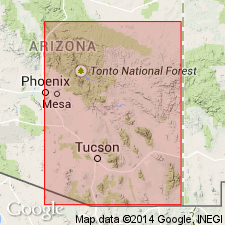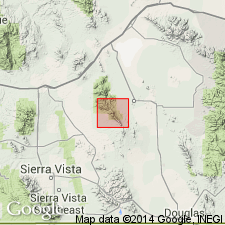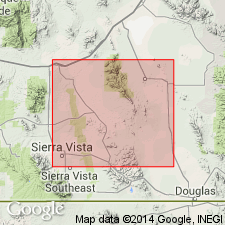
- Usage in publication:
-
- Cochise formation
- Modifications:
-
- Original reference
- Dominant lithology:
-
- Limestone
- Shale
- Sandstone
- AAPG geologic province:
-
- Pedregosa basin
Summary:
Pg. 466, 479, 480, 482. Cochise formation. Recognized in Whetstone Mountains and Bisbee region, southeastern Arizona. At type locality, in Whetstone Mountains, it is 311 feet thick and consists of (descending): (1) Upper division characterized by blue limestone, which at base is rather grayish, brownish, and mottled, and alternates with shale, and in upper part contains some thin-bedded, calcareous, micaceous sandstone layers with NEOLENUS INTERMEDIUS PUGIO Walcott; (2) yellow, pink, gray, white, purple, buff, and red shales, in upper part alternating with calcareous shale and thin rubbly limestone, the pink and gray shale containing OBOLUS (WESTONIA) CHUARENSIS (Walcott) and AGRAULOS n. sp., 116 feet; (3) pink and reddish, thin-bedded sandstones, 30 feet. Rests on Pima sandstone and underlies Abrigo formation [restricted to middle part of Abrigo limestone of previous reports, or to 420 to 430 feet of thin-bedded, cherty, dolomitic gray limestone containing listed fossils]. Age is Middle Cambrian.
[Origin of name not stated.]
Source: US geologic names lexicon (USGS Bull. 896, p. 478).

- Usage in publication:
-
- Cochise formation
- Modifications:
-
- Areal extent
- AAPG geologic province:
-
- Pedregosa basin
Summary:
May be represented by 50 ft of poorly exposed shales between underlying Bolsa quartzite and Abrigo formation in the Dragoon Mountains, Cochise Co, AZ in Pedregosa basin. Is of Cambrian age.
Source: GNU records (USGS DDS-6; Denver GNULEX).

- Usage in publication:
-
- Cochise formation
- Modifications:
-
- Not used
- AAPG geologic province:
-
- Pedregosa basin
Summary:
Cochise formation of Stoyanow (1936). Not used in type area, Whetstone Mountains, Cochise County, southeastern Arizona. Rocks included in zone at base of Abrigo limestone, along with rocks of Pima sandstone (not used). Gradational contact with underlying Bolsa. Report includes geologic map.
Source: Modified from GNU records (USGS DDS-6; Denver GNULEX).
For more information, please contact Nancy Stamm, Geologic Names Committee Secretary.
Asterisk (*) indicates published by U.S. Geological Survey authors.
"No current usage" (†) implies that a name has been abandoned or has fallen into disuse. Former usage and, if known, replacement name given in parentheses ( ).
Slash (/) indicates name conflicts with nomenclatural guidelines (CSN, 1933; ACSN, 1961, 1970; NACSN, 1983, 2005, 2021). May be explained within brackets ([ ]).

